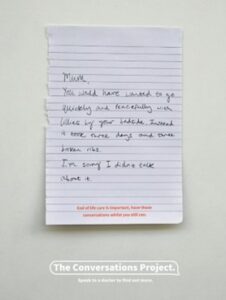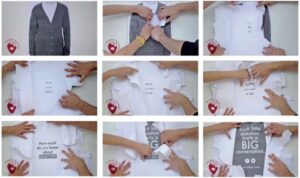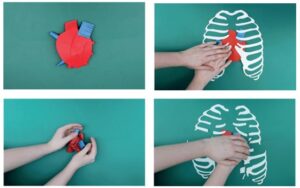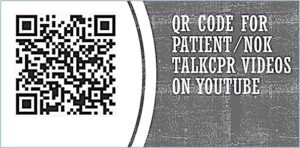Talking about palliative illness and future treatment wishes, including future resuscitative attempts, may not sound like a project that translates to art easily. But a collaboration between Falmouth University School of Art, and Cardiff University School of Medicine proved this notion wrong.[i]
A graphic design collaboration within medical palliative care settings demonstrated a powerful and effective way of addressing practical, psychological, social and spiritual issues that face people at the end of their lives, and was reviewed by patient/carer representatives. The ‘Talk CPR’ project in Wales [ii] [iii] has multiple facets, including work in 2017 with graphic design lecturers and students from Falmouth University, who have an end-of-life art project called MOTH. This is an ‘ethnographical’ approach to research, more details of which can be found here.
The MOTH collaborative practice project team from Falmouth University, facilitated a project with a Welsh palliative care initiative for its twenty Stage 2 Graphic
Design students, inviting external partners from medicine, palliative care, writing & design for the live environment.[iv] Prof. Mark Taubert, Clinical Director/Consultant in Palliative Medicine at Velindre University NHS Trust, Cardiff University School of Medicine, invited ideas on how visual communication designers and medics could benefit from sharing knowledge and skills to impact on policy, practice and communication regarding end of life matters. He gave a talk to the art students about the issues patients face in palliative care settings. Sometimes this involves thinking about future attempts to attempt or withhold cardiopulmonary resuscitation (CPR). CPR hardly ever works for people who have advanced cancer, and can be a very traumatic process for the body to go through. Mark, who is national lead for Advance Care Planning in NHS Wales, invited ideas on graphic designs to facilitate such discussions. This included patient information resources, such as the talkcpr.com initiative from Wales. It is a project endorsed by NICE and the Royal College of Physicians, and uses video materials to convey this sometimes challenging topic of conversation, both during regular working hours [v] in the out-of-hours settings. [vi] The Covid-19 pandemic also saw an increase in use of online communication and associated resources. [vii]
This resulted in the students, as part of their year 2 coursework, creating thought-provoking artwork that looked at CPR from a very different angle, compared to the more typical mainstream healthcare approaches of blue background patient information leaflets. Students produced videos, images and photographs (examples in images 1-3) These designs, as well as the stop-frame animation video they produced are still in use and are available on the TalkCPR website (Image 4: QR code that takes users to the TalkCPR video site) and on the BywNawr/Live Now YouTube Channel. The “Know Your Heart” video, produced by students, has clocked up thousands of views.




https://moth.org.uk/Four-Deadlines-A-Dinner
Acknowledgement:
Thank you to the following students who were at Falmouth University at the time of this project and who created artwork for this project.
The Plan: James Cook, Joe Arnold, Hannah Hosegood, Sam Baker.
Let’s Talk CPR: Alicia Bray-Whitworth, Jemma Edwardes, Sarah Lebaigue.
The Conversations Project: Theo Hallas.
Little questions, big conversations: Florentino Alameda Monteiro, Poppy Andruskevicius, Adele Bright, Ellie Woodman.
#talkdeath: Martha Holmes, Lucy Scholes, Theo Penrice.
Their lecturers, Nikki Salkeld and Ashley Rudolph, made this project happen and are the driving force behind the Moth project at Falmouth University.
References:
[1] National Institute for Health & Social Care – Shared Learning Resources The MOTH TalkCPR Project https://www.nice.org.uk/sharedlearning/the-moth-talkcpr-art-in-medicine-project (accessed 07/03/2023)
[1] Taubert M, Norris J, Edwards S, Snow V, Finlay IG. Talk CPR – a technology project to improve communication in do not attempt cardiopulmonary resuscitation decisions in palliative illness. BMC Palliat Care. 2018;17(1):118.
[1] NHS Wales Executive https://talkcpr.wales 2017 (accessed 07/03/2023)
[1] Taubert, M Room for some art – addressing the difficult topic of death, dying and resuscitation https://eapcnet.wordpress.com/2017/11/06/room-for-some-art-addressing-the-difficult-topics-of-death-dying-and-resuscitation/ European Association for Palliative Care (accessed 07/03/2023)
[1] Hall CC, Lugton J, Spiller JA, et al CPR decision-making conversations in the UK: an integrative review BMJ Supportive & Palliative Care 2019;9:1-11.
[1] Taubert M, Noble SIR, Nelson A What challenges good palliative care provision out-of-hours? A qualitative interview study of out-of-hours general practitioners BMJ Supportive & Palliative Care 2011;1:13-18.
[1] Abel J, Taubert M Coronavirus pandemic: compassionate communities and information technologyBMJ Supportive & Palliative Care 2020;10:369-371.

Prof. Mark Taubert is a consultant in palliative care in Cardiff and is Advance Care Planning lead for the NHS Wales Executive Twitter: @ProfMarkTaubert

Nikki Salkeld is a Senior Lecturer at Falmouth University on the BA(Hons) Graphic Design course and co-runs the MOTH project

Ashley Rudolph is also a Senior Lecturer at Falmouth University on the BA(Hons) Graphic Design course and runs MOTH with Nikki
MOTH is a collaborative project that considers the aesthetics of death, the educational implications and the design potential for the context it might serve.